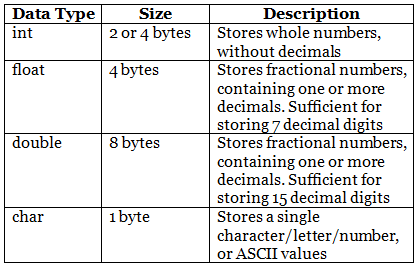C Data Types & Constants | C Programming for Beginners - Class 6 PDF Download
Data Types
As explained in the Variables chapter, a variable in C must be a specified data type, and you must use a format specifier inside the printf() function to display it:
Example
// Create variables
int myNum = 5; // Integer (whole number)
float myFloatNum = 5.99; // Floating point number
char myLetter = 'D'; // Character
// Print variables
printf("%d\n", myNum);
printf("%f\n", myFloatNum);
printf("%c\n", myLetter);
Basic Data Types
The data type specifies the size and type of information the variable will store.
In this tutorial, we will focus on the most basic ones:

Constants
When you don't want others (or yourself) to override existing variable values, use the const keyword (this will declare the variable as "constant", which means unchangeable and read-only):
Example
const int myNum = 15; // myNum will always be 15
myNum = 10; // error: assignment of read-only variable 'myNum'
You should always declare the variable as constant when you have values that are unlikely to change:
Example
const int minutesPerHour = 60;
const float PI = 3.14;
Notes On Constants
When you declare a constant variable, it must be assigned with a value:
Example
Like this:
const int minutesPerHour = 60;
This however, will not work:
const int minutesPerHour;
minutesPerHour = 60; // error
Good Practice
Another thing about constant variables, is that it is considered good practice to declare them with uppercase. It is not required, but useful for code readability and common for C programmers:
Example
const int BIRTHYEAR = 1980;
|
10 videos|13 docs|15 tests
|

|
Explore Courses for Class 6 exam
|

|

















